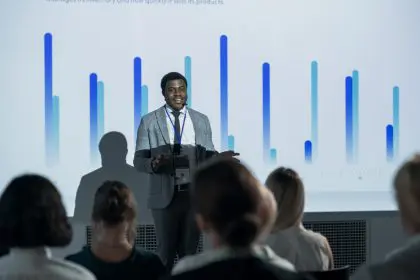
Antonia Dean spots overlooked opportunities where others see only risk. As principal at Black Ops Ventures, a seed-stage investment firm, Ms. Dean evaluates founders who are building solutions for markets traditionally ignored by mainstream investors. Her focus: businesses serving the 61% of Americans who struggle with financial security, a demographic she sees as both underserved and ripe for innovation.
Her unconventional path to venture capital began when she declined a corporate law career after Harvard Law School, choosing instead to work with luxury brands. She helped develop Calvin Klein Fragrances, Michael Kors, Vera Wang and Le Labo before transitioning to corporate innovation. At Comcast’s Startup Engagement team, Ms. Dean oversaw investments in venture funds and led direct investing in underrepresented founders, following earlier work mentoring entrepreneurs at Venture For America and leading engagements at Archetype Solutions Group.
This diverse background gives Ms. Dean, who lives in the Philadelphia area with her husband and two sons, a distinct perspective on what makes a founder worth backing. Beyond evaluating market size and business models, she looks for traits that aren’t always visible in pitch decks: curiosity, self-awareness, and comfort with ambiguity.
For her, the first idea is rarely the best one; she prioritizes founders who understand their limitations and demonstrate a clear process for navigating uncertainty—qualities she considers essential for turning promising concepts into successful ventures.
How did you become the principal at Black Ops Venture Capital?
I have a bit of a long and winding career to VC. But I will boil it down for you. I had been in a nonprofit and helped that organization raise its first venture fund. I saw that access to capital is really the thing that keeps smart people with great ideas from either being able to turn those ideas into long running businesses, or where those ideas just stay in the idea phase.
And that was the thing that got me really excited about being able to invest capital into great businesses. I went from doing it in a nonprofit context to doing it in a corporate context, and have now been full time investing with Black Ops for about two and a half years.
You’ve worked with iconic brands. What lessons from that work do you bring into evaluating startups today?
I’ve worked with a number of iconic brands. My very first job was working on Calvin Klein Fragrance, also worked on Vera Wang, Michael Kors, and many others, and the one thing that they all have in common, regardless of whether it’s a brand name that you’ve ever heard of, or one that is something that your mother, grandmother has been using is a promise of something that you actually want. Oftentimes entrepreneurs will have an idea and say, this is a really great thing, I would love this thing, but that doesn’t mean the rest of the world will love it.
It’s about finding the thing that everyone wants, or that a significant number of people want, and being able to build a business around that. So when I’m looking at investments, I’m always looking at how big is the potential market for this solution. And is this a thing people want and are willing to pay for because oftentimes people want something better, but they’re not willing to spend $1 more, or do anything differently to get there. The market isn’t as big as you think.
Black VC funders are few and far between. At Black Ops, what are you most passionate about when it comes to backing Black founders?
I am really passionate about investing in Black founders, because I’m really passionate about investing in businesses that have big markets, and where the person who’s creating the solution understands and has experienced the problem. And what I find is in general that there are very, very big markets that are ignored by the larger players.
If you look at luxury, fashion, beauty, they often target people who make $100,000 a year or more. But the reality is 61% of Americans can’t afford a $400 emergency. I really love investing in the companies that are talking to those people because there are actually more of them, and they’re more primed to want that better solution, because often they’ve been ignored by the bigger players in the market.
What do founders often overlook when they pitch VCs for early stage capital?
The things that I’m always looking for when a founder is pitching me is, I’m looking at what is the problem, how big is the problem, how many people are affected by the problem, how much money does this problem cost us each year—those kinds of metrics that show me how big something is that they’re working on.
I’m interested in understanding why this founder is well suited to be the person to solve that problem, whether they have some unique insight, some unique kinds of experience, or another connection point that makes them very passionate about it.
And then always the question is, why now? If it’s been going on all this time, why is now the right time? Is it because now we have AI that is able to do something? Is it because now there is government spending to support something? Is it because now consumers are realizing and they’re seeking out this kind of solution? Those are always the three things that I look for—why this problem? Why this founder? And why now?
Beyond the deck, what traits or mindsets indicate a founder is worth backing?
From a VC context, especially when you invest early stage, you’re making a bet on that founder that they will be able to figure the thing out. Your first idea is not always your best idea. So the traits in the mindset that I’m looking for are folks who are really curious—people who are super self-aware, which means they know what they don’t know, and they know to ask for help for it, and ask an expert for their opinion rather than being like, “I’m gonna figure this out all by myself.”
Those are the things that I’m looking for, and I’m looking for someone who’s comfortable in that space, who is comfortable saying, “This is what I know, this is what I don’t know, but this is how I figure it out,” because if it was easy as 1, 2, 3, everyone would be the founder of a billion dollar company. There’s a whole lot of ambiguity. So I’m looking for someone who’s comfortable in ambiguity, and who could figure their way towards the solution.
How can founders build with cultural authenticity while scaling globally?
I think it’s whatever kind of company that you’re building. If authenticity is something that you want to make sure that you’re delivering on, you need to make sure that if not you, your customer is well represented in your company.
If you are building a software for truck drivers, you should have someone who has been a truck driver who works at your company because they can give you the small things. We all know when someone is trying to relate to us, but they just get it—just that last little bit is not right. And you can tell, they don’t really know what they’re talking about. They’re not from this space. They don’t understand this thing.
So if the founder doesn’t have it themselves, then they should make sure that they are hiring for that, that they are creating partnerships, so that exposure to what’s true for that customer that they’re trying to have that authentic connection with. You want to make sure you always have that represented in the way that you build the company.
You’ll be at the Roadmap to Billions conference. What do you want your audience to take away from your talk, and what advice would you give Black women founders attending for the first time?
I’ll be speaking at the conference on Friday. My session is specifically “The Future is Funded and Female,” and we’ll be talking about the realities of raising money for companies, and what all of that universe of options looks like.
What I want anyone who’s coming to the conference, and who hears my talk to walk away with is, we often get in these spaces, and we hear the metrics, the doom and gloom. The less than 1% or less than 1/10th of 1%. But sometimes we use that to discourage us, and it doesn’t have to.
If we look at less than 2% of doctors, are Black women, but Black women are signing up to go to medical school every day, and we would never discourage someone who said they wanted to be a doctor. So don’t let those numbers discourage you if what you want to do is build a successful thriving company. Because if you look back at your history, you’re already in the less than 1%, regardless of where you are. You’ve already defied the odds, so you can just keep on defying them.
How can people follow your journey and learn more about Black Ops VC?
You can look me up on Instagram or LinkedIn. My Instagram is Antonia Dean PHL. For Philadelphia, which is where I’m from and where I live, and you can look me up on Instagram, or on LinkedIn just at Antonia Dean. Feel free to follow along our journey as we continue to build Black Ops and invest in really amazing companies.
Our website is blackopsvc.com.















